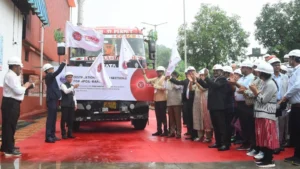Prelims Bits

Context
India has established its first private-sector testing facility for the upgradation of heavy water, a crucial component in nuclear reactors.
Background: Pressurized Heavy Water Reactor (PHWR)
- A PHWR is a nuclear reactor that uses heavy water (D₂O) as both the moderator and coolant.
- It enables the use of natural uranium as fuel, eliminating the need for costly enrichment processes.
- Heavy water is kept under pressure to avoid boiling, permitting the reactor to operate at higher temperatures.
- For optimal reactor performance, D₂O must be maintained at 99.9% purity.
- Over time, heavy water gets diluted with light water, reducing its effectiveness.
- Hence, it requires re-purification through a vacuum distillation process.
Private Sector Involvement
- TEMA India, a Mumbai-based private engineering company, has developed this test facility for upgrading depleted heavy water.
- Until now, testing and validation were conducted exclusively by Bhabha Atomic Research Centre (BARC).
Technology Transfer & Role of TEMA India
- BARC has transferred indigenous technology to TEMA India for fabricating vacuum distillation columns.
- TEMA’s responsibilities:
- Manufacture equipment required for heavy water purification.
- Test the components to validate their effectiveness in restoring D₂O purity.
Deployment Details
- The first batch of tested distillation column segments is designated for Unit 8 of the Rawatbhata Atomic Power Project (RAPP-8) in Rajasthan.
- Future deployments include:
- 4 reactors at the Gorakhpur nuclear project in Haryana.
- 2 reactors at Kaiga in Karnataka.
India’s Nuclear Energy Goals
- Installed Capacity Goals:
- 22.4 GW of nuclear capacity by 2032.
- 100 GW targeted by 2047.
- Nuclear Energy Mission:
- Aims to develop Small Modular Reactors (SMRs) for faster deployment and scalability.
- Current Status:
- 24 nuclear reactors are operational across India.
- The total installed nuclear energy capacity stands at 8,780 MW.




